Christine Smallwood meets up with Paolo Arrigo and finds out about his deep-rooted connection with the soil
Photos courtesy of Paolo Arrigo
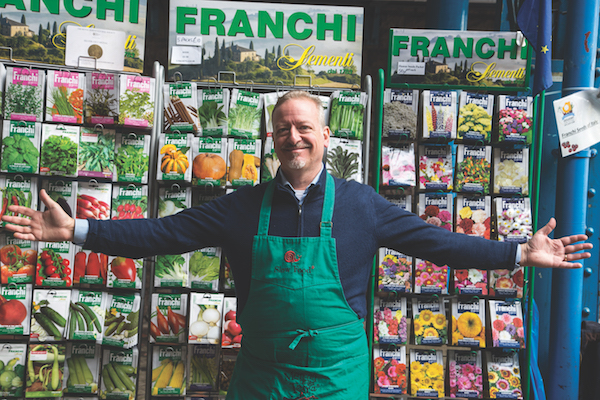
Last spring I rediscovered a book that has been on my shelf for a decade. As I planted some veg seeds in my garden for the first time, From Seed to Plate by Paolo Arrigo was inspiring and valuable reference material. Having failed to inherit my parents’ vibrant green fingers, Paolo’s guiding hand was especially helpful to me because his friendly cultivation advice links growing directly to eating. And I certainly wanted to enjoy the edible rewards of my efforts.
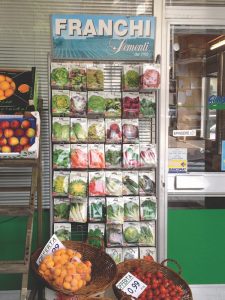
A seedsman, Paolo Arrigo, through his company, Seeds of Italy, is the importer for Franchi Seeds in Bergamo, which, he happily says is run by the seventh generation of the same family. He talks expansively about how seeds are “literally the most important thing in the world,” is proud of the ethical credentials of the business and adamant that “for us, it’s food; we are food. We see ourselves as food”.
One merely has to look at his Italian blood and heritage to find the origin of his steadfast belief in the unbreakable connection between seeds and growing plants to eat. “I remember asking my nonna, ‘What’s for dinner?’ and she told me to look out of the window. I did and I saw tomatoes and celery.”
From his Italian home of Biella, northeast of Turin, his maternal great-grandmother travelled to London in 1890. (She still married a man from Piemonte though.) The family put down roots in England, literally: Paolo’s grandfather had three allotments, on the site which is now Brent Cross Shopping Centre, and Paolo feels he takes after him in many ways, describing them both as “gardening troublemakers”.
Helping out
Fast forward to Paolo’s father, Vincenzo, and a gorgeous photo of him as a young man looking like a moody film star with sexy sunglasses, at Piccadilly Circus. Vincenzo worked in various fields, and for a while ran a deli, where predictably, in the Italian family way of small businesses, young Paolo helped out.
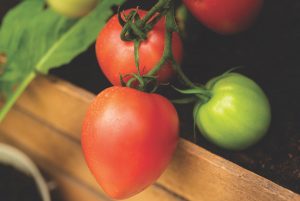
He recalls that growing up, whenever someone from the family returned to Italy they were always asked to bring back some Italian seeds, perhaps some real basil or some rocket (in the days before it could be bought over here). Paolo thought it would be a cool thing to have an Italian seed stand in the family deli. He laughs when remembering that back then he hadn’t realised that here in England seeds were sold in garden centres, because in Italy they’re always sold alongside food. Regardless, he diligently went through the seed packets in his father’s shed to find a company to contact, and came across Franchi. He didn’t know anything about them but that chance find meant he ended up working with the oldest family-run seed company in the world.
It’s fascinating listening to Paolo talk about vegetable varieties. “We sell more cavolo nero kale seeds here than we do in Italy”, he says, explaining that in the days of the Grande Giro (the Grand Tour), the Victorians would always bring back seeds with them, and always some Tuscan cavolo nero packs.
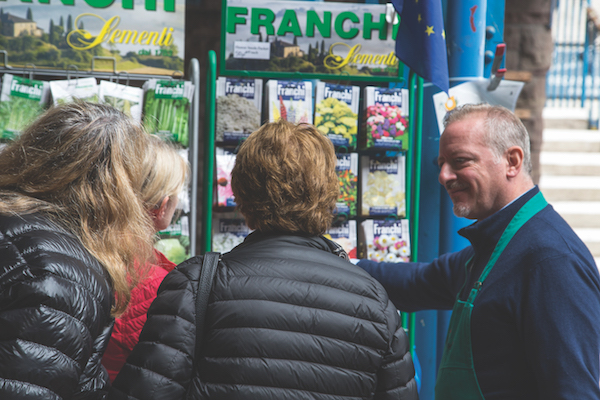
The family home
For a man who speaks such good Italian, it’s surprising that the language wasn’t always spoken in the family home. He remembers it being used only when Italian friends came round, when football was on the TV or when people were having heated discussions “because you can’t have a decent argument in English.”
Although Paolo strongly dislikes the term “Britalian” he’s the first to smilingly admit that “I love all things Italian: I love my accordion, my cars, my football, my rugby too, my food, my wine, but I can’t go to Italy without a jar of Marmite, Earl Grey teabags and a packet of bacon.” So, arguably the perfect Anglo-Italian mix. Living here in England there are lots of Italian traditions that he continues, and has handed down to his children because he’s always enjoyed them. For instance, he is an ardent mushroom picker, going out as a child with his father, and now with his son and brother, to their favourite secret places to find funghi. It all fits in with his belief that “Italy is not a country; Italy is a way of life.”
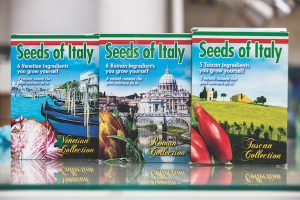
But back at work, he is proud that Franchi are not just seed sellers, but seed producers. “A seedsman is someone who is really there from the start to the finish and Franchi are proper seedsmen.” They still use a system called ‘commissioning’ whereby they give farmers stock seeds, which are true originals, and they pay for the farmer to grow not the produce, but the seeds. Apparently the old farmers’ adage was that you ‘save 10 per cent of your crop for seed’, and he explains that Franchi is a firm known for its open-pollinated varieties or traditional varieties where the seeds can be kept and passed down, from mother and father to son and daughter. He is well aware that if seed prices go up, then food prices inevitably go up too. And he knows despairingly that when a seed packet says ‘packaged in’ the seeds inside could well have been produced in a country far away from the packaging plant.
He is also annoyed that he still hears of careers officers recommending that people consider horticulture or gardening “only if they can’t get a proper job. It’s crazy, because we need really intelligent people in horticulture. Our future is completely dependent on horticulture and growing food.”
Which is why he treasures the seeds in his warehouse, even those in damaged packaging. He and his team might return from a garden show with some seed packets that have been ripped, or some stock might have become faded or blemished. He can end up with a crate full of seeds that are in date and perfectly viable, but he can’t sell them. And of course, sometimes it happens that he might have ordered too many of something. So rather than incinerate them, or throw them away, Paolo and his team make a big effort to give them to schools, old peoples’ homes, charities and various community schemes. He is convinced that this ultimately helps everyone in the seed business, simply because it gets people growing. This is such a good, social-minded idea, and Paolo loves the fact that schools send Seeds of Italy pictures of “kids with big smiley faces, holding veg they’ve grown from our seeds!” He’s also a firm believer that “kids who grow veg, eat veg.” It’s indisputably a win-win.
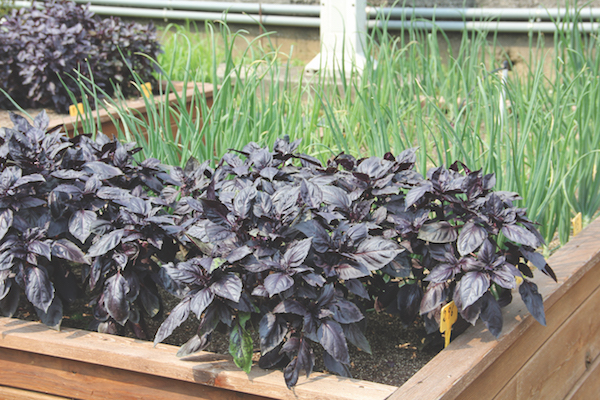
Straightforward advice
As a keen grower himself, he thinks that many people overcomplicate gardening. He was certainly encouraging to me, and kept his advice straightforward when I struggled with some varieties. “Remember that if a year is good for one crop, it must be bad for another. At the end of the day, it’s a seed: you sow it, you water it, and if the conditions are right, then it will grow and you’ll have great produce.”
Some may find it puzzling that Paolo doesn’t think that organic seeds are “the be all and end all”, but he attaches far more significance to regionality. Not least because he sees that the supply of organic seeds is very small and he would rather have “a regional, non-organic seed, produced by an ethical company – say a regional tomato from the slopes of Vesuvius – than an organic ACE 55VF (a modern variety that is consistent). They’re round, all mature at the same size, shape and juiciness, all with the same flavour but they have no soul, no regionality, no provenance.”
And that’s a message that he repeats often. Paolo Arrigo doesn’t run a food business in the commonly held sense of that term: he is a seedsman, importing and selling fascinating, regional varieties that grow well over here. He’s keen to emphasise the differences between the food of the Mediterranean and that of the Alps, stressing that “Italy is 74 per cent Alpine”. And, of course, that’s the zone from which he hails, and is one of the reasons why he’s so adept on advising which veg plants are winter hardy and which ones will thrive in the UK climate.
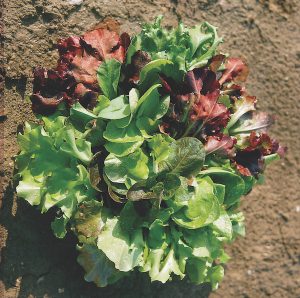
Seasoned with love
It’s tempting to say that it all started with a seed stand but as with so many great Italian food stories, it started at home. In Paolo’s case with a nonna preparing food seasoned with love, and taking the time to talk to her grandchildren about dinner. He is now proud that he runs a seed company that started, and continues, with food. His seeds and practical advice helped me in my tentative steps towards cultivating veg, and his infectious enthusiasm meant I was excited about eating my produce from the first appearance of seedlings. I’m still far too floundering to consider myself a gardener but I’m loving my freshly picked cut-and-come-again cicoria bianca while nurturing my pea, bean, rocket, tomato, broccoli, lettuce and garlic plants, and most importantly, looking forward to eating them all at their home-grown and freshly picked best.
More information
Franchi Seeds is the world’s oldest family-run seed company. Specialising in rare and heirloom seeds, it is Slow Food UK approved and was the first seed company to be invited by Slow Food to exhibit at the Salone del Gusto. Last year it launched a biodiversity range and introduced vegan accreditation.
See also Seeds of Italy for more details on Paolo Arrigo and his work.
